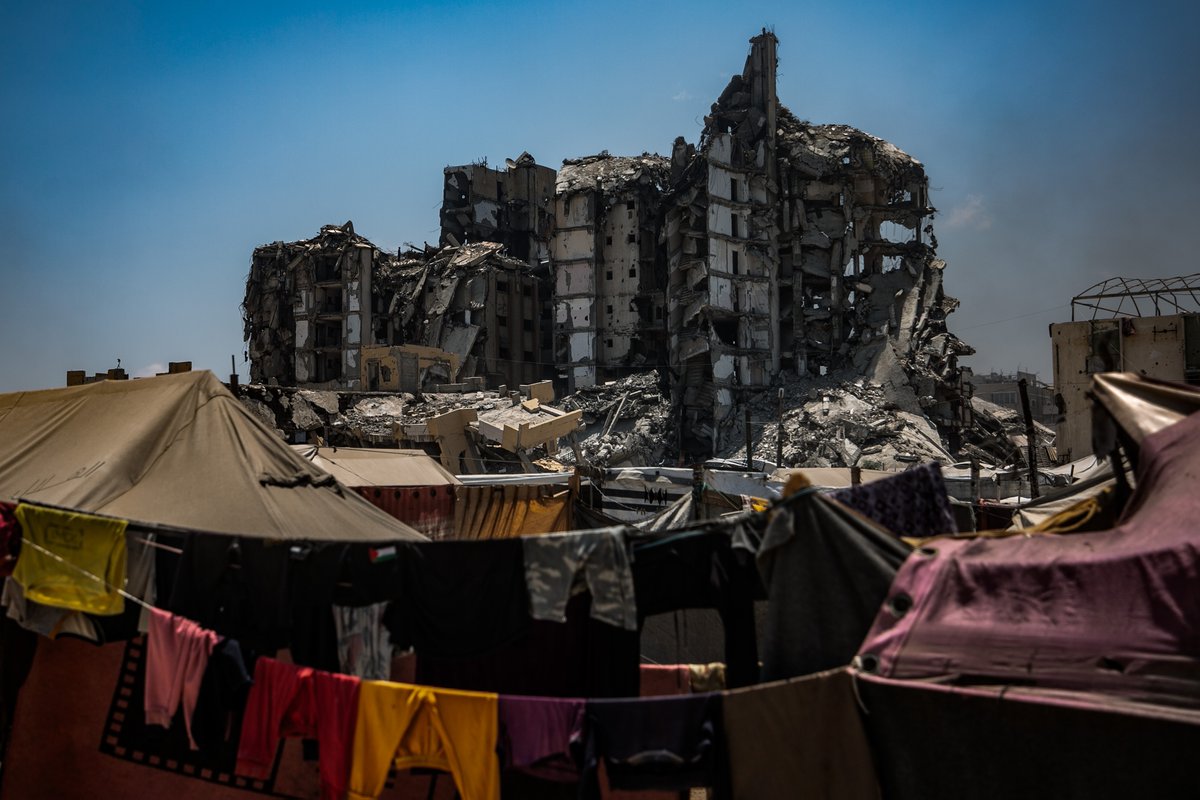The sky above Gaza has become a ceiling of fear. Every hour, Israeli warplanes roar overhead, and the ground shakes beneath us.
Israel has issued new evacuation orders for the entire population of Gaza City to leave, in preparation for its full-scale ground occupation of the city by October 7, 2025. But for many of us, leaving is no longer a choice.
I am now displaced with my small family—my wife, Somai, and our nine-month-old son, Omar—in the al-Nasser neighborhood in western Gaza City. The war has exiled us from our real home in al-Tuffah, on the eastern side of the city. Israel’s current orders state we must move south, but it’s impossible to do so.
Transportation costs would be around 1,500 Israeli shekels—equivalent to about $446—an amount far beyond our reach. Even if we could somehow gather the money, southern Gaza has already collapsed under the weight of constant displacement and is crammed with families much like ours—tents torn by heat, children sleeping on bare soil, and no safety anywhere. Much of the land in southern Gaza, in cities like Deir al-Balah and Khan Yunis, has already been seized by the Israeli military.
So, my family has decided that we will remain where we are. If death comes, it will find us inside our home in al-Nasser—not on the road and not in another exile. Better to die standing in our place than to wander endlessly, stripped of every dignity.
This is not the first time we have been displaced. When the war erupted on October 7, 2023, we were among the countless who fled to southern Gaza, driven by fear, not knowing what awaited us.
We thought then that evacuation meant safety. But safety never came. We spent more than a year in the south, tasting the bitterness of being strangers in our own land, only to return to Gaza City in January 2025 with nothing but scars.
I still remember the day that should have been the happiest day of my life. My wedding was supposed to take place on December 14, 2023. Instead, it was swallowed by war. Somai and I were both in Rafah, on the southern end of the Gaza Strip, each of us trapped in different houses under bombardment. She found shelter in her aunt’s home. For weeks, we were only a few streets apart, yet separated by fire, rubble, and fear. Neither of us wanted to lose the other, but even attempting to meet became a risk too heavy to bear.
Eventually, we decided: war or not, we would get married. Not in a wedding hall with music, laughter, and family, not with flowers or the white dress she had dreamed of. Rather, I went to her aunt’s house and took her hand. There was no feast, no dancing, no photographs—only a quiet promise between two souls who had decided that even if death came, it should find us together, not apart.
Our first home as husband and wife was not an apartment but a small, cold warehouse in Rafah. There was no kitchen and no cupboard, only a wooden table for our clothes and a small toilet in the corner. But it was ours. It was where we learned to live with nothing but love, where we whispered to each other that survival was still possible.
In May 2024, Israel issued new evacuation orders for the displaced in Rafah. I immediately called a relative in the Nuseirat refugee camp in central Gaza, desperate to find a roof for my family. By some miracle, he managed to secure a spot for us to stay—a small room inside a wedding hall, which became our refuge. And just as in our previous shelter, we salvaged what little dignity we could: a single wooden table, which became our wardrobe.
It was there, in Nuseirat, that hope began to stir within us again. My wife’s belly grew round, carrying the promise of new life. On November 24, 2024, our son Omar was born at al-Awda Hospital. In that moment, despite everything, he became our light—like a ray of sunshine piercing the thickest darkness. We lived in Nuseirat refugee camp for nearly nine long months before finally making our way back to Gaza City in January 2025.
The journey back to Gaza City, however, was brutal. We were forced to walk along the coastal road, stripped of our dignity. I staggered under the weight of two heavy bags and a gas cylinder for nearly ten miles, while my wife carried Omar—just three months old—close to her chest.
Now, as I hold our baby boy in my arms, I think about those early days. I wonder what kind of life he will inherit—a life of constant displacement, or a life rooted in dignity.
Each night, as bombs shake the ground beneath us, I find myself making the same silent prayer: If we must die, let us die together, so that none of us is left behind to weep alone. Because here in Gaza, sometimes the only choice left is not where to go—but how to face the end.

